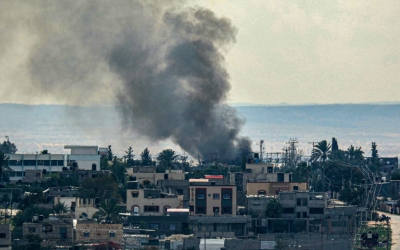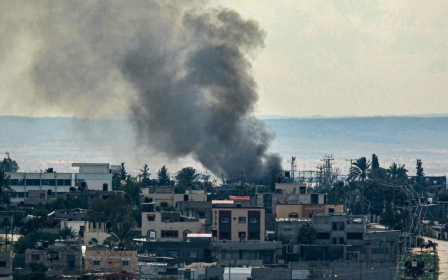US approved more than 100 arms sales to Israel since October, reports say

The Biden administration has delivered more than 100 different sales of military aid to Israel since its war on Gaza began last October, according to several US news outlets citing a classified briefing given to members of Congress by administration officials.
The aid delivered to Israel includes thousands of precision-guided munitions, small-diameter bombs and bunker-buster bombs, among other types of lethal aid.
The sale and delivery of the weapons, reported by The Washington Post and Wall Street Journal, provides a clearer picture of the behind-the-scenes military support that Washington has provided Israel since October, despite growing public scrutiny over Biden's support for the war over the last five months.
Only two approved military sales to Israel were made public since the start of the war. One sale consisted of $106m worth of tank ammunition and the other was for $147.5m worth of components needed to make 155mm artillery shells.
However, the more than 100 other transactions were allowed to go through without public disclosure or need to notify Congress because they fell under a specific dollar amount, US officials and lawmakers told The Washington Post.
New MEE newsletter: Jerusalem Dispatch
Sign up to get the latest insights and analysis on Israel-Palestine, alongside Turkey Unpacked and other MEE newsletters
According to the Forum on the Arms Trade, the dollar amount threshold that requires the administration to notify Congress of an arms sale for Israel is $14m for major defence equipment, $50m for defence articles or services, and $200m for design and construction services.
State Department spokesman Matt Miller told The Washington Post that the administration has “followed the procedures Congress itself has specified to keep members well-informed and regularly briefs members even when formal notification is not a legal requirement”.
Miller said US officials have "engaged Congress" on arms transfers to Israel "more than 200 times" since October.
Growing scrutiny over US arms to Israel
The war in Gaza began on 7 October when Hamas led an attack on southern Israel that killed 1,139 people, according to an official figure reported by AFP. At least 240 people were also taken hostage.
Israel responded by imposing a full siege on Gaza, which included cutting off Gaza's water supply, and also launched an indiscriminate aerial bombing campaign. Weeks later, it launched a ground invasion of Gaza.
Israeli forces have so far killed more than 30,000 Palestinians, the majority of whom have been women and children.
The Biden administration showed its unconditional support for Israel as it began its military assault on Gaza. And its sales of arms to Israel have been under scrutiny for months, given the large-scale devastation in Gaza caused by Israeli forces.
In just the days after the war began, Josh Paul, the top State Department official overseeing arms transfers, resigned, citing the US decision to fast-track weapons to Israel without proper scrutiny.
A growing number of lawmakers are also calling on the US to cut aid to Israel, or at least be used as leverage to prevent Israel from making moves that could harm Palestinian civilians.
A recent letter signed by more than 30 members of Congress called on Biden to prevent an Israeli invasion of the city of Rafah in southern Gaza, saying that such a campaign would violate US arms transfer policy.
Middle East Eye delivers independent and unrivalled coverage and analysis of the Middle East, North Africa and beyond. To learn more about republishing this content and the associated fees, please fill out this form. More about MEE can be found here.





